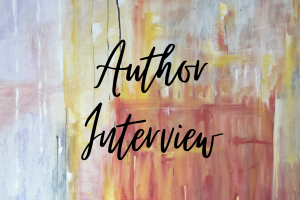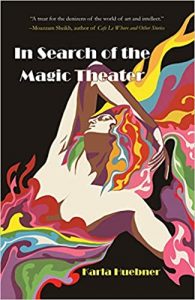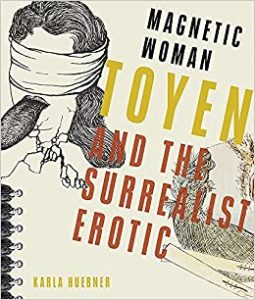The Fun of Fiction: An Interview with Karla Huebner
 It’s always a pleasure to feature authors who live or work in my area, and Karla Hueber falls into that camp. She’s Professor of Art History at Wright State University here in Dayton, Ohio, and she specializes in “1750-present with research interests that include Czech modernism, surrealism, and gender and sexuality.” Though an accomplished nonfiction and academic writer, she’s a part of the 2022 Debuts group, having just released her first novel, In Search of the Magic Theater, earlier this month. Author Moazzam Sheikh says that the book “offers a sophisticated meditation on the idea of art, mythology, (experimental) theater and music (classical and jazz) as two women, separated by a generation and divided by a cultural shift—from 60s to post-60s—negotiate sexuality, love, regret, grief, and above all forgiveness.” Sound fascinating, right? And might I add how gorgeous the cover is? (See image below and read on for what inspired that cover.) Karla has been enjoying her book launch and recently participated in a multi-author event, so I know how precious her spare time is. Many thanks to her for her informative and thoughtful answers!
It’s always a pleasure to feature authors who live or work in my area, and Karla Hueber falls into that camp. She’s Professor of Art History at Wright State University here in Dayton, Ohio, and she specializes in “1750-present with research interests that include Czech modernism, surrealism, and gender and sexuality.” Though an accomplished nonfiction and academic writer, she’s a part of the 2022 Debuts group, having just released her first novel, In Search of the Magic Theater, earlier this month. Author Moazzam Sheikh says that the book “offers a sophisticated meditation on the idea of art, mythology, (experimental) theater and music (classical and jazz) as two women, separated by a generation and divided by a cultural shift—from 60s to post-60s—negotiate sexuality, love, regret, grief, and above all forgiveness.” Sound fascinating, right? And might I add how gorgeous the cover is? (See image below and read on for what inspired that cover.) Karla has been enjoying her book launch and recently participated in a multi-author event, so I know how precious her spare time is. Many thanks to her for her informative and thoughtful answers!
Christina: Congrats on the publication of In Search of the Magic Theater, which is a literary novel with women’s fiction and romcom elements. What’s the origin story for this book?
Karla: A friend of mine once remarked that people who read a lot in high school either read a lot of Hermann Hesse or a lot of Ayn Rand. While I doubt that this holds true for today’s teen readers, I think it was fairly accurate for many in my generation, and I was in the Hesse camp. Steppenwolf is the only Hesse novel I’ve reread since my twenties, and I periodically return to it. When I was around forty, I felt a great need to make some changes in my life—one of which involved going back to school and eventually getting a PhD in art history. In the process of contemplating what on earth I should do with myself, it occurred to me that it would be interesting to write a novel akin to Steppenwolf, but in which a woman rather than a man was struggling with a turning point in midlife. I wasn’t yet ready to write such a book, but the idea stuck in my mind.
At that stage I think I knew that Kari was leaving her husband, but I didn’t know much else about her. Margaret Atwood’s Lady Oracle was also in my mind, since it involves a woman who runs away, but I don’t think that Lady Oracle ended up being a very strong influence.
However, I didn’t actually write In Search of the Magic Theater until I was in the final months of my PhD, when I terribly missed writing fiction and found myself rapidly writing this one. I was able to write quickly partly because I let myself steal much more of the structure of Steppenwolf than I had originally intended. For example, I decided that Kari’s landlady could have a niece named Sarah just as Harry Haller’s landlady has a nephew. Sarah, however, wasn’t willing to take the limited role of the nephew, but proved to have a great deal to say!
Christina: Julie Wittes Schlack said of the book: “Through the voices of two women with overlapping lives but diverging paths, Karla Huebner explores the tension between control and surrender, reason and ecstasy, dreaming and choosing.” How difficult was it to make these two voices distinct? And how to bring to the surface that tension but not overwhelm the reader?
Karla: Well, fortyish Kari and early-twenties Sarah have very different attitudes and perspectives, so they’re quite different in terms of what they have to say. They’re both seriously involved in the arts, but Sarah’s a classical cellist still in school while Kari has a history of doing experimental theater but drifted away from it during her marriage. As I recall, while their thoughts and views came to me very much as if I were channeling spirits, Kari’s words flowed readily along whereas Sarah’s verbal rhythm often felt jerkier, more labored, because Sarah is an angrier, more repressed, more secretive person. As for how to get the tension without overwhelming the reader, I’m not sure I can say. Sarah is often pretty tense! One could characterize one of these narrators as more Apollonian and one as more Dionysian, yet each alternates between these classic poles. And that’s not even addressing what the male characters bring to the story, whether creatively or erotically. We’ll have to see whether the reader is overwhelmed, and if the reader is, whether it is in a desirable way or an unfortunate way.
Christina: This is your debut novel, but you’ve written short stories, articles, and Magnetic Woman: Toyen and the Surrealist Erotic, which is “part art book and part biography” and “examines the life and work of the artist Toyen (Marie Čermínová, 1902–80), a founding member of the Prague surrealist group.” Does your writing process differ for each type of writing? Does one call to you over the others?
Karla: Well, first of all I’d have to say that while I had a wonderful time researching and writing Magnetic Woman, a project that involved delving into a whole slew of interrelated historical topics including Czech literature from Decadence to surrealism, nonfiction is not nearly as fun for me as fiction. Fiction is where my heart is. When I write fiction, I can enter a poetic dream-state and find out what happens. Who are my characters and how do they reveal themselves? What will they say? I had no idea that Sarah was going to be a tall and prim young cellist. Whereas with nonfiction, I need to be careful to get my facts and analysis lined up properly and write clearly so that the reader doesn’t need to be a specialist to understand me. I’m reasonably adept at nonfiction but it can be painful going because I can’t just let the words flow. Nonetheless, sometimes my nonfiction is poetic too, and I’m very happy when I can achieve poetic yet accurate and informative nonfiction.
As for process, that depends on the project. Again, with nonfiction there’s more need to plot out what goes where and what can’t be left out. It’s less fluid of a process. On the other hand, my novels (and I’ve got several seeking the right home and several others in progress) don’t all form in just one manner. I wrote In Search of the Magic Theater quickly and easily—once I really got started with it—and each chapter was written in the order that you see in the published book. Some novels are like that for me, and others get written completely out of order and over a period of years. If I have a scene in mind, I’ve got to write it before I forget it, before the muse vanishes.
Christina: You’re trained as an art historian. Aside from topic or theme, how does that inform your writing?
Karla: Here I think it is less a matter of my being an art historian and more my being an interdisciplinary scholar that informs my work. I have a pretty voracious interest in many different things, which means that my scholarly nonfiction has dealt with women’s history, gender, and sexuality, as well as art history, film, and periodical studies. The result for my fiction is, in part, that I can readily create characters who are immersed in some of these things. Kari Zilke isn’t an art historian or an artist, but she knows enough about art to be familiar with Girodet’s painting Endymion (1791), a work that I and many other art historians routinely teach. (This painting, by the way, is the basis of the novel’s more psychedelic-looking front cover design.) My knowledge of art has also given spice to some of my more recent novel projects. But I’m not sure that being an art historian has had more of an effect on my fiction than, for instance, my having majored in theater as an undergrad and later having worked for two theaters, or than my having learned to play several instruments growing up (although not cello or guitar!). My background in music and theater was hugely important for writing In Search of the Magic Theater.
Christina: The bio for you at Amazon says that you’ve “lived on a boat and worked in factories, offices, theater, publishing, oil refineries, private investigation, and drug rehab.” How have these diverse experiences impacted your writing?
Karla: My life choices have largely been about feeding my fiction, so after I got my BA, it was important to me to experience many different work environments and kinds of people. I don’t think it makes much sense for a fiction writer to lead a sheltered life, although of course that does work well for some writers. I have felt a certain regret at playing it as safe as I have, but at least I’ve had close friends who lived more dangerously and lived to tell me about it. I’m not likely to write lots of fiction about English professors (although my father was one), or even about art history professors (although one novel has a minor character who is one).
Christina: In crafting questions, I always check out authors on social media. What stood out to me are your glasses, which are awesome. But it seems you have multiple pairs. Do you view these as accessories? Do you match them to your outfit or fit them to your mood? What other accessories are important to you?
Karla: People do seem to enjoy my glasses these days, which is nice—I like to be able to provide visual pleasure. As a person who has worn glasses since the age of seven and can’t see clearly for more than a few inches without them, glasses are a pretty important part of my waking life. It was pretty neat when I could first afford to have prescription sunglasses as well as the regular pair! However, styles in frames aren’t always kind to my face. For about ten years I pretty much hated everything on the market. When frames that I liked began to appear again, I had become a tenured professor with a decent salary, so I decided I was willing to buy two frames at the same time to insure against future periods of ugly frames. A few months later I bought lenses for one of them, and a few months after that, the second pair got lenses. I mean, nice glasses with a strong prescription are unfortunately quite expensive! But what I can tell you about having several different pairs of glasses is that, once your prescription stabilizes in later life, and if your income will permit such extravagance, it’s absolutely great. I didn’t realize until I had a red pair and a blue pair what a difference it makes to your whole outfit. There is always one pair that looks better with a given outfit than the other pairs. Anyway, I would not have said that I think a lot about so-called accessories, but it’s true that even when I was really poor I would treat myself to a new color of leather gloves each year, and I always have several colors of beret. But I also keep my clothes until they self-destruct. I try to buy things I’ll love for years or even decades.
Christina: What does literary success look like to you?
Karla: At the deepest, most meaningful level, l believe literary success means readers finding and connecting with my work for many years to come (barring near-term human extinction, that is). On a more superficial but still important level, literary success looks like having a good agent to handle the business side of my writing, and not having to steal time and energy from writing in order to publicize and promote my books—in other words, that I am commercially successful enough to have a good support team and can enjoy doing author events that I don’t have to organize on my own. We can all dream, right?
Karla can be found in multiple places!
Website: http://www.karlahuebner.com/
Instagram: @karlahuebnerwrites
Twitter: @KarlaHuebner
Facebook: Karla-Huebner-writer
Thanks to Karla for agreeing to this interview! If you know of an author who’d like to be featured in an interview (or you are an author who would like to be featured), feel free to leave a comment or email me via my contact page.


